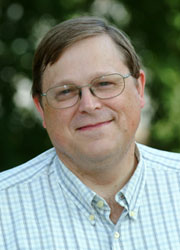HAVERFORD BIOLOGY PROFESSOR TAKES ON NEW ROLE AS ASSOCIATE PROVOST

Details
As the new Associate Provost of the College, Professor of Biology Philip Meneely has plans. He plans to support Provost J. David Dawson in any way he can, examine what works and what doesn't about the way the office is run, help fellow faculty members better understand the decisions made by the Provost, and—most importantly—not screw up.
Considering that Meneely has served or held leadership roles on a number of Haverford committees—he has been the natural sciences' representative on Academic Council, the Academic Council's representative on the College Planning Committee, interim director of the Koshland Integrated Natural Sciences Center, chair of the biology department, and director of Haverford's Howard Hughes Medical Institute program, which funds biomedical research, faculty development, and science education—the chances of“screwing up” seem slim at best.
The Punxsutawney, Pa., native has amassed his share of administrative responsibilities during his decade at Haverford, but teaching and research—particularly in the field of genetics—remain his first loves.“Genetics lets you think about where things come from, what gets people from one generation to the next,” he says.“It brings up the question, ‘What is the meaning of existence?'” It was this fascination that led him to major in biology at Geneva College in Beaver Falls, Pa.
Meneely went on to receive a Ph.D. in genetics from the University of Minnesota and completed postdoctoral research at the University of Colorado in Boulder. In graduate school he began working with the worm Caenorhabditis elegans, also known as C. elegans.“When we started working with it, there were 12 labs in the world using it, and 77 people total,” he says.“Now there are over 3,000 scientists studying it, but I'm proud to have been one of the first 77.”
Most of his postdoctoral research focused on sex determination, particularly how the X chromosome differs from all others:“So many things make it special—for instance, in humans, only a few of the X chromosome's genes have anything to do with the difference between males and females.” He continued this research as a faculty member at the Fred Hutchinson Cancer Center in Seattle.
When Meneely came to Haverford in 1995, he was spurred by a desire to work more directly with students.“When I interviewed with (Professor of Biology) Judy Owen, I felt immediately that this was a person who would be a great friend and colleague,” he says.“We had a common vision of undergraduate science education.” He has great admiration and affection for all of his students, whom he describes as“intellectually fearless.”
For as long as he's been at Haverford, Meneely's research has centered on meiosis, a fundamental biological process of all organisms that have a nucleus and chromosomes:“We have 46 chromosomes, and when we make sperm or eggs we put 23 of these into the egg cell for offspring. That process of going from 46 to 23 is what we call meiosis.” Every mammal has two copies of each chromosome, and Meneely examines the ways in which the individuals find their partners within a cell. He still uses C.elegans in his experiments; it's inexpensive, easy to grow in a laboratory, and develops quickly. The worm is so popular among biologists that, when scientists first considered sequencing the human genomes, they turned to C.elegans when they were unable to test humans:“It's the first animal to have its DNA completely sequenced.” At every opportunity, he involves students in his research projects. Right now, there's a group searching for the molecules responsible for some chromosomes' inability to stay together once paired.
In addition to his teaching and research responsibilities, Meneely has served on an American Cancer Society advisory panel in developmental biology, a National Institutes of Health postdoctoral review panel for genetics, and the National Science Foundation eukaryotic genetics section. In his free time, Meneely goes home to Ardmore, where he lives with his wife Deb, a librarian at the Newtown Square Public Library, and his daughter Alison, a recent graduate of Franklin & Marshall College who now attends nursing school at Harcum College in Bryn Mawr. His son, Andy, attends Calvin College in Michigan.
Now, as he prepares to assume his new mantle, Meneely thinks of a "Far Side" cartoon depicting a woefully unprepared orchestra percussionist, about to perform with only one cymbal. His only thought:“Don't screw up. Don't screw up.”
“I feel the same way,” he laughs.



